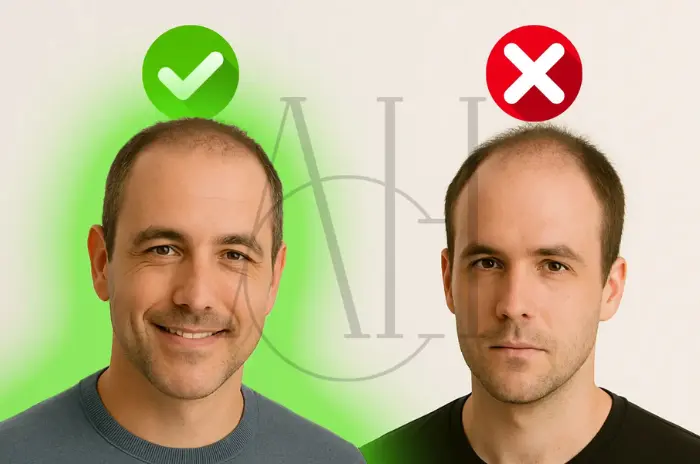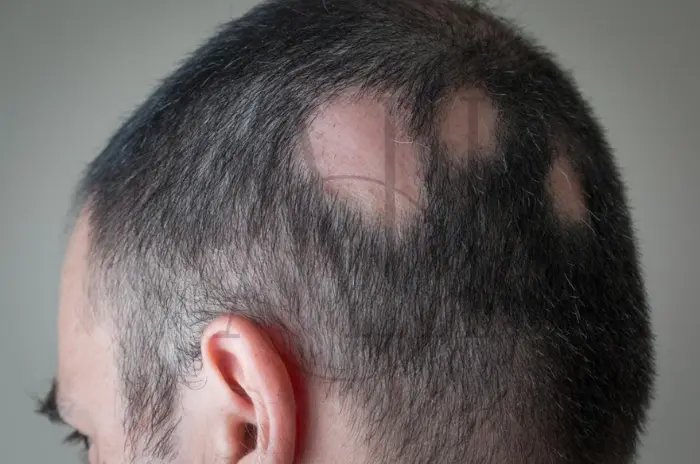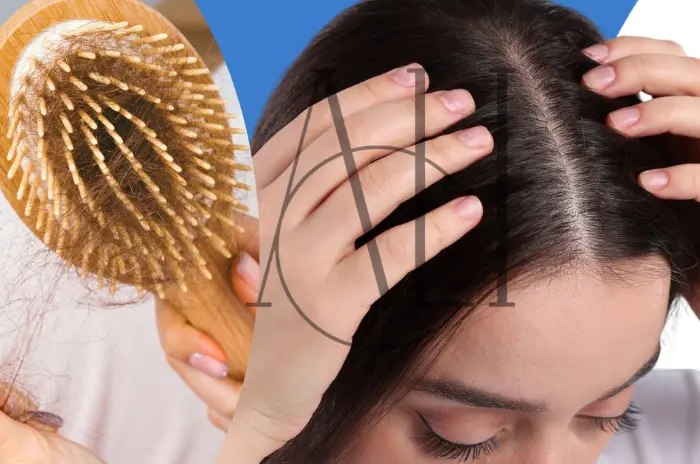Hair loss affects millions of people worldwide, leading many to search for effective solutions that can restore their confidence and hair density. Among the numerous supplements and treatments available, Nutrafol has gained significant attention as a natural approach to hair growth. But does this popular supplement actually deliver on its promises? As hair restoration professionals, we’ll examine the science, effectiveness, and real-world results of Nutrafol to help you make an informed decision about your hair health journey.
Table of Contents
ToggleWhat Is Nutrafol and How Does It Support Hair Growth?
Nutrafol is a physician-formulated dietary supplement designed to target multiple underlying causes of hair thinning and loss. Unlike topical treatments, this oral supplement works from within to create an optimal environment for healthy hair growth.
Understanding the Key Ingredients in Nutrafol
Nutrafol’s formula contains a blend of clinically-researched ingredients that work synergistically to address hair loss:
| Key Ingredient | Function | Benefits |
|---|---|---|
| Saw Palmetto | DHT blocker | Reduces hormone-related hair loss |
| Ashwagandha | Stress reducer | Lowers cortisol levels affecting hair |
| Marine Collagen | Protein support | Strengthens hair structure |
| Biotin | Vitamin B7 | Supports keratin production |
| Tocotrienols | Antioxidants | Protects follicles from damage |
The supplement also includes vitamins A, C, D, and various minerals that support overall hair health. Each ingredient is selected based on scientific research demonstrating its role in promoting healthy hair growth cycles.
How Nutrafol Targets the Root Causes of Hair Loss
Rather than addressing only surface-level symptoms, Nutrafol approaches hair loss through multiple pathways:
- Hormonal balance: By inhibiting 5-alpha reductase, the enzyme that converts testosterone to DHT
- Stress management: Through adaptogenic herbs that help regulate cortisol levels
- Inflammation reduction: Using antioxidants to protect hair follicles from oxidative stress
- Nutritional support: Providing essential vitamins and minerals often deficient in hair loss sufferers
This multi-target approach distinguishes Nutrafol from single-ingredient supplements that may only address one aspect of hair loss.
Is Nutrafol Safe for Long-Term Use?
Nutrafol is generally considered safe for long-term use, as it contains natural ingredients rather than pharmaceutical compounds. The supplement is:
- Free from drugs and synthetic hormones
- Non-GMO and gluten-free
- Third-party tested for purity
- Manufactured in FDA-registered facilities
However, as with any supplement, individual responses may vary, and some users may experience mild digestive effects during the initial adjustment period.
Does Nutrafol Really Work for Hair Growth?
To properly evaluate Nutrafol’s effectiveness, it’s essential to compare it with clinically proven hair growth treatments that have established track records in the medical community.
Clinically Proven Hair Growth Treatments
The gold standard treatments for hair loss include:
FDA-Approved Medications:
- Minoxidil (topical solution)
- Finasteride (oral medication for men)
- Dutasteride (off-label use)
Professional Procedures:
- Hair transplant surgery
- Platelet-Rich Plasma (PRP) therapy
- Low-level laser therapy
Minoxidil: A Gold Standard for Hair Regrowth
Minoxidil remains one of the most effective topical treatments for hair loss, with decades of clinical research supporting its use. This FDA-approved medication works by:
- Increasing blood flow to hair follicles
- Extending the anagen (growth) phase of hair cycles
- Stimulating follicle miniaturization reversal
Clinical studies show that minoxidil can improve hair count by 20-30% in responsive patients, with results typically visible within 3-4 months of consistent use.
PRP Therapy: Boosting Natural Hair Follicles
Platelet-Rich Plasma therapy has emerged as a promising treatment for pattern hair loss. This procedure involves:
- Drawing the patient’s blood
- Concentrating platelets through centrifugation
- Injecting the PRP into thinning areas of the scalp
Research indicates that PRP can increase hair density by 15-25% and improve hair thickness in many patients after 3-6 treatment sessions.
Laser Therapy: A Non-Invasive Hair Loss Solution
Low-level laser therapy (LLLT) devices have shown effectiveness in clinical trials for both men and women with androgenetic alopecia. These devices work by:
- Stimulating cellular metabolism in hair follicles
- Increasing ATP production
- Improving microcirculation in the scalp
Studies demonstrate that consistent use of FDA-cleared laser devices can increase hair count by 20-35% over 16-26 weeks of treatment.
Nutrafol Compared to Other Hair Growth Treatments
Understanding how Nutrafol stacks up against established treatments helps provide perspective on its role in hair loss management.
Nutrafol vs Minoxidil: Which Works Better?
| Aspect | Nutrafol | Minoxidil |
|---|---|---|
| Mechanism | Internal nutritional support | Direct follicle stimulation |
| Application | Oral supplement | Topical application |
| Evidence Level | Limited clinical data | Extensive clinical research |
| Results Timeline | 3-6 months | 3-4 months |
| Side Effects | Minimal | Scalp irritation, unwanted hair growth |
While minoxidil has more robust clinical evidence, Nutrafol may complement topical treatments by addressing internal factors contributing to hair loss.
How Nutrafol Stands Out from Common Supplements
Compared to basic biotin or generic hair vitamins, Nutrafol offers:
- Comprehensive formula: Multiple targeted ingredients rather than single nutrients
- Clinical research: Some studies on individual components
- Quality control: Third-party testing and pharmaceutical-grade manufacturing
- Professional endorsement: Recommended by some dermatologists and trichologists
What Makes Nutrafol a Physician-Recommended Option?
Healthcare professionals may recommend Nutrafol because it:
- Addresses multiple hair loss pathways simultaneously
- Contains well-researched ingredients with established safety profiles
- Provides a non-pharmaceutical option for patients seeking natural approaches
- Can complement medical treatments without significant interactions
Nutrafol vs Biotin: What Science Says
While biotin is essential for hair health, research shows that biotin deficiency is rare in developed countries. Nutrafol’s advantage over standalone biotin includes:
- Broader nutrient profile: Addresses multiple deficiencies simultaneously
- Synergistic effects: Ingredients work together for enhanced benefits
- Targeted approach: Specifically formulated for hair loss rather than general health
Real Results: Does Nutrafol Actually Work?
Examining the available evidence helps determine whether Nutrafol lives up to its marketing claims.
Clinical Studies Behind Nutrafol’s Effectiveness
The clinical evidence for Nutrafol includes:
Published Research:
- A 2020 study showed improved hair growth in women after 6 months of use
- Individual ingredient studies support the supplement’s theoretical basis
- User surveys indicate satisfaction rates of 70-80% among consistent users
Limitations of Current Research:
- Limited number of independent studies
- Relatively small sample sizes
- Short-term follow-up periods
- Lack of comparison with established treatments
What Users Are Saying About Their Hair Growth
User testimonials and reviews reveal mixed but generally positive experiences:
Positive Reports:
- Reduced hair shedding after 2-3 months
- Improved hair texture and thickness
- New baby hair growth along the hairline
- Enhanced overall hair health and shine
Common Concerns:
- High cost for long-term use
- Delayed results requiring patience
- Variable effectiveness between individuals
- Need for continuous use to maintain benefits
When to Expect Visible Results with Nutrafol
Nutrafol’s timeline for results typically follows this pattern:
| Timeframe | Expected Changes |
|---|---|
| 1-2 months | Reduced hair shedding |
| 3-4 months | Improved hair texture |
| 4-6 months | Increased hair density |
| 6+ months | Maximum benefits achieved |
It’s important to note that hair growth is a slow process, and results may vary significantly between individuals based on factors such as age, genetics, and underlying health conditions.

Should You Try Nutrafol for Hair Thinning?
Determining whether Nutrafol is right for you depends on several personal and medical factors.
Who Is an Ideal Candidate for Nutrafol?
Nutrafol may be most beneficial for individuals who:
- Experience early-stage hair thinning or diffuse hair loss
- Prefer natural approaches over pharmaceutical medications
- Have nutritional deficiencies contributing to hair loss
- Want to complement existing medical treatments
- Cannot tolerate or prefer to avoid topical medications
Less Ideal Candidates:
- Individuals with advanced pattern baldness (Norwood 5-7 or Ludwig 3)
- Those seeking rapid results
- People with severe underlying medical conditions causing hair loss
- Individuals unable to commit to long-term supplementation
How to Get the Best Results from Nutrafol
To maximize the potential benefits of Nutrafol:
Consistency Guidelines:
- Take the supplement daily as directed
- Allow 6 months for full evaluation of effectiveness
- Combine with healthy lifestyle practices
- Track progress with photos and measurements
Complementary Approaches:
- Maintain a balanced diet rich in hair-healthy nutrients
- Manage stress through exercise and relaxation techniques
- Use gentle hair care products and avoid excessive heat styling
- Consider professional treatments for enhanced results
Consulting a Doctor Before Starting Nutrafol
Medical consultation is recommended for:
- Individuals with thyroid disorders or hormonal imbalances
- People taking medications that may interact with supplements
- Those with sudden or severe hair loss patterns
- Anyone considering Nutrafol alongside other hair loss treatments
An intermediary organization can help connect you with qualified professionals who specialize in hair loss evaluation and treatment planning.
Safety and Possible Side Effects
Understanding the safety profile of Nutrafol helps users make informed decisions about long-term supplementation.
Is Nutrafol Free of Drugs and Hormones?
Nutrafol contains only natural ingredients and botanical extracts, avoiding:
- Pharmaceutical drugs like finasteride or dutasteride
- Synthetic hormones or hormone precursors
- Harsh chemicals or artificial additives
- Stimulants or mood-altering substances
This natural approach makes Nutrafol suitable for individuals who prefer to avoid pharmaceutical interventions or cannot tolerate medication side effects.
Potential Digestive or Thyroid Effects
While generally well-tolerated, some users may experience:
Mild Side Effects:
- Initial digestive discomfort or nausea
- Changes in bowel movements during adjustment period
- Rare allergic reactions to botanical ingredients
Thyroid Considerations:
- Some ingredients may interact with thyroid medications
- Iodine content could affect thyroid function in sensitive individuals
- Regular monitoring may be necessary for those with thyroid disorders
Who Should Talk to a Doctor First?
Medical consultation is particularly important for:
- Pregnant or breastfeeding women
- Individuals with autoimmune conditions
- People taking blood-thinning medications
- Those with known allergies to supplement ingredients
- Anyone with chronic medical conditions
How Long Until You See Results?
Setting realistic expectations about Nutrafol’s timeline helps users stay committed to the regimen and properly evaluate its effectiveness.
Company Guidance: 3–6 Months for Results
Nutrafol’s manufacturer provides the following timeline expectations:
Month 1-2: Foundation Building
- Reduced hair shedding
- Improved scalp health
- Enhanced hair texture
Month 3-4: Early Growth
- New hair growth initiation
- Increased hair strength
- Visible reduction in hair loss
Month 5-6: Optimal Results
- Noticeable increase in hair density
- Improved overall hair appearance
- Maximum supplement benefits
Why Consistency Really Matters
Hair growth is a complex biological process that requires sustained nutritional support. Inconsistent supplementation can lead to:
- Delayed or reduced results
- Return of previous hair loss patterns
- Incomplete evaluation of the supplement’s effectiveness
- Wasted investment in the product
Tips for Maintaining Consistency:
- Set daily reminders or alarms
- Incorporate Nutrafol into established routines
- Use pill organizers for travel or busy schedules
- Track progress to maintain motivation
What Happens if You Stop Taking It?
Discontinuing Nutrafol may result in:
- Gradual return to previous hair loss patterns
- Loss of improvements gained during supplementation
- Resumption of underlying hair loss causes
- Need to restart the growth cycle if resuming later
For this reason, Nutrafol should be viewed as a long-term commitment rather than a short-term solution.
Is Nutrafol Worth Trying?
Evaluating the cost-benefit ratio of Nutrafol helps determine its value in your hair loss management strategy.
Who Should Consider Nutrafol?
Nutrafol may be worth trying for individuals who:
Primary Candidates:
- Have mild to moderate hair thinning
- Prefer natural, non-pharmaceutical approaches
- Can commit to 6+ months of consistent use
- Have adequate financial resources for long-term supplementation
- Want to complement other hair loss treatments
Secondary Considerations:
- Experience stress-related hair loss
- Have nutritional deficiencies affecting hair health
- Seek a low-risk addition to their hair care routine
- Value physician-formulated supplements
Where to Buy Nutrafol and Cost Considerations
Nutrafol is available through multiple channels:
Purchase Options:
- Official Nutrafol website (subscription discounts available)
- Authorized retailers and pharmacies
- Healthcare provider offices
- Licensed online retailers
Cost Analysis:
| Purchase Method | Monthly Cost | Annual Investment |
|---|---|---|
| Single Purchase | $79-89 | $948-1,068 |
| Subscription | $69-79 | $828-948 |
| Professional Discount | $65-75 | $780-900 |
When considering cost, factor in the price of alternative treatments and the potential long-term benefits of improved hair health.

How Does Nutrafol Compare to Hair Transplants?
Understanding the fundamental differences between supplementation and surgical hair restoration helps set appropriate expectations for each approach.
Effectiveness: Supplements vs. Surgical Hair Restoration
Hair Transplant Advantages:
- Permanent, dramatic results
- Immediate visible improvement (after healing)
- High success rates (95%+ graft survival)
- One-time procedure (usually)
- Effective for advanced hair loss
Nutrafol Advantages:
- Non-invasive approach
- No downtime or recovery period
- Lower financial investment
- Suitable for early-stage hair loss
- Addresses underlying causes
| Aspect | Nutrafol | Hair Transplant |
|---|---|---|
| Results | Modest improvement | Dramatic transformation |
| Timeline | 3-6 months | 6-12 months |
| Permanence | Requires ongoing use | Permanent |
| Investment | $800-1,000/year | $4,000-15,000 one-time |
| Risk Level | Very low | Low to moderate |
When to Consider a Transplant Over Supplements Like Nutrafol
Hair transplant surgery may be the better choice when:
- Hair loss has progressed beyond early stages
- Supplements and medications have proven ineffective
- Rapid, dramatic results are desired
- Long-term cost-effectiveness is a priority
- Permanent solution is preferred over ongoing maintenance
An intermediary organization can help evaluate your candidacy for surgical hair restoration and connect you with qualified surgeons who specialize in modern transplant techniques.
Hair Transplant vs. Nutrafol: Which Solution is Right For You?
Making the right choice between supplementation and surgical intervention requires careful consideration of multiple factors.
When Supplements Aren’t Enough: Considering a Hair Transplant
Nutrafol and similar supplements may have limitations in cases of:
Advanced Pattern Baldness:
- Norwood Class 5-7 in men
- Ludwig Grade 2-3 in women
- Extensive crown or frontal baldness
- Long-standing hair loss (10+ years)
Specific Hair Loss Types:
- Scarring alopecia
- Traction alopecia with permanent damage
- Genetic predisposition to aggressive hair loss
- Failed response to multiple non-surgical treatments
Patient Preferences:
- Desire for immediate, visible results
- Preference for one-time intervention
- Intolerance to ongoing supplement regimens
- Need for dramatic hair density improvement
Can Nutrafol Help You Avoid or Delay a Transplant?
Early intervention with Nutrafol may help delay surgical intervention by:
- Slowing the progression of hair loss
- Maintaining existing hair health
- Improving the quality of remaining hair
- Addressing reversible causes of hair thinning
Success Factors for Delaying Surgery:
- Starting supplementation early in the hair loss process
- Combining Nutrafol with other proven treatments
- Addressing lifestyle factors contributing to hair loss
- Regular monitoring by hair loss professionals
Expert Opinions on Surgical vs. Supplement Solutions
Hair restoration specialists generally recommend a staged approach:
Phase 1: Non-Surgical Intervention
- Lifestyle modifications and stress management
- Nutritional optimization (including supplements like Nutrafol)
- Topical treatments (minoxidil, prescription options)
- Professional therapies (PRP, laser therapy)
Phase 2: Surgical Consideration
- Evaluation after 12-18 months of non-surgical treatment
- Assessment of hair loss progression and pattern
- Discussion of realistic expectations and outcomes
- Consideration of age, lifestyle, and financial factors
Combined Approach: Many experts recommend using Nutrafol and other supplements as part of a comprehensive hair loss prevention strategy, even after hair transplant surgery, to:
- Protect non-transplanted hair
- Optimize healing and growth
- Maintain long-term results
- Address ongoing hair loss causes
FAQ
What is Nutrafol and how does it claim to promote hair growth?
Nutrafol is a physician-formulated dietary supplement with natural ingredients targeting multiple causes of hair loss. It works internally by reducing DHT production, managing stress-related hair loss, providing essential nutrients, and reducing follicle inflammation.
Are there independent clinical studies or scientific evidence supporting Nutrafol's effectiveness?
Nutrafol has limited clinical research compared to FDA-approved treatments. A 2020 study showed improved hair growth after 6 months, and individual ingredients have supporting research. However, studies have small sample sizes and limited independent comparisons to established treatments.
How does Nutrafol compare to other well-known hair loss treatments like Minoxidil, PRP, or laser therapy?
Minoxidil shows 20-30% hair count improvement, PRP increases density by 15-25%, and laser therapy improves count by 20-35%. Nutrafol provides internal nutritional support but has less robust clinical evidence compared to these proven medical treatments.
What are the potential side effects of taking Nutrafol, and is it considered safe for long-term use?
Nutrafol is generally safe for long-term use with natural ingredients. Common side effects include mild digestive discomfort and nausea initially. People with thyroid disorders should be cautious as some ingredients may interact with thyroid medications.
How long does it typically take to see noticeable results from Nutrafol, and what happens if you discontinue use?
Results typically appear in 3-6 months: reduced shedding (1-2 months), improved texture (3-4 months), increased density (4-6 months). Discontinuing Nutrafol leads to gradual return of previous hair loss patterns, making it a long-term commitment.
Who is an ideal candidate for Nutrafol, and is it necessary to consult a healthcare professional before starting?
Ideal candidates have early-stage hair thinning, prefer natural approaches, or want to complement medical treatments. Medical consultation is recommended for pregnant/breastfeeding women, those with autoimmune conditions, thyroid disorders, or taking blood-thinning medications.
Is Nutrafol a cost-effective solution for hair thinning, and where is the best place to purchase it?
Nutrafol costs $69-89 monthly ($800-1,000 annually), requiring ongoing payments. It’s available through the official website, authorized retailers, pharmacies, and healthcare providers. While less expensive than hair transplants ($4,000-15,000), consider long-term costs.
When should someone consider a hair transplant instead of, or in addition to, supplements like Nutrafol?
Consider hair transplant when hair loss is advanced (Norwood 5-7, Ludwig 2-3), supplements haven’t worked after 12-18 months, or rapid permanent results are desired. An intermediary organization can help connect you with qualified professionals for evaluation.




